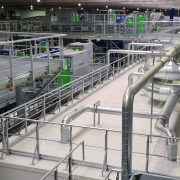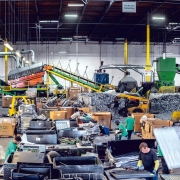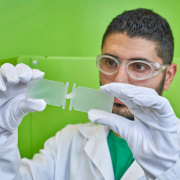Study: Investment Gap to Meet EU’s Plastics Recycling Targets
In March, the European Investment Bank (EIB) published a new study titled “Cutting plastics pollution – Financial measures for a more circular value chain”.
The authors have analyzed the inefficiencies of the plastics value chain and their solutions in the European Union. Furthermore, they examined ten root causes of the plastic waste problem and identified investment opportunities and policy measures “that will help address the world’s growing plastic crisis”. According to EIB, implementing a fully circular economy in plastics is essential in the face of the ever-increasing complexity of the underlying compounds. “In the global context, the European Union is performing comparatively well in addressing plastic waste pollution and has set itself ambitious targets under the European Strategy for Plastics,” the authors stated. Nevertheless, they found out that an estimated investment gap of 6.7 to 8.6 billion Euro had to be closed to achieve Europe’s pledged goal of placing on the EU market each year 10 million metric tons of plastic recyclates in final products by 2025. “Achieving these targets requires substantial investment and a reliable end market for the recycled content. The largest gaps in sorting and recycling are identified in EU cohesion regions, centered on Central and Eastern Europe and South-East Europe.”
Given the complexities of the plastics value chain, many of the necessary improvements would require policy measures combined with targeted financial instruments. “Policy recommendations by the study include legislative measures to tackle difficult-to-recycle plastics packaging, restrictions on composite packaging (such as packaging combining paper and plastics) and imposing quotas on recycling while boosting public awareness campaigns.”
The report, carried out by the Bank’s Innovation & Digital Finance Advisory division under the InnovFin Advisory mandate from the European Commission, also comprises financial recommendations to address the problem of plastic waste pollution both within and outside the European Union. These would include loans to corporate and mid-cap companies, municipalities, and local authorities as well as support to research, development, and innovation activities, EIB emphasized.
About InnovFin
“InnovFin – EU Finance for Innovators” is a joint initiative launched by the European Investment Bank Group (European Investment Bank and European Investment Fund) in cooperation with the European Commission under Horizon 2020. It aims to facilitate and accelerate access to finance for innovative businesses and other innovative entities in Europe.
InnovFin Advisory assists eligible public and private counterparts to improve the bankability and investment readiness of large, complex, innovative projects that need substantial long-term investments.
www.eib.org/en/publications/20220248-cutting-plastics-pollution
(Published in GLOBAL RECYCLING Magazine 2/2023, Page 8)








